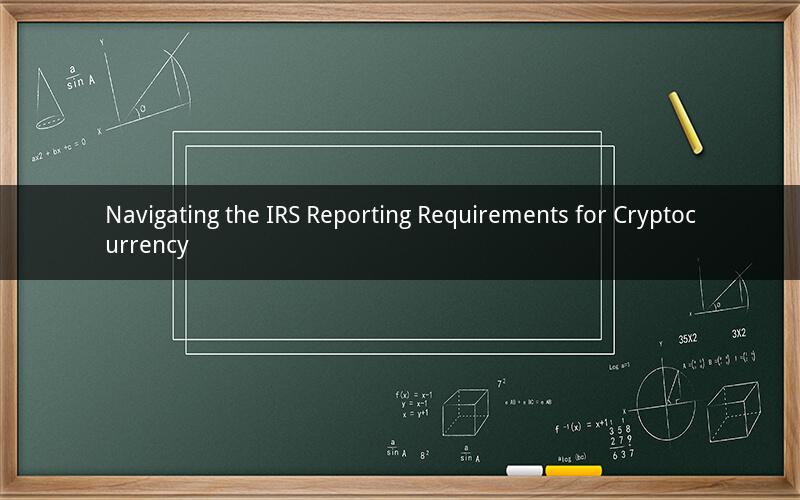
Cryptocurrency has gained immense popularity in recent years, attracting both individual investors and businesses. However, with this growing interest comes the responsibility of reporting cryptocurrency transactions to the Internal Revenue Service (IRS). This article aims to provide a comprehensive guide on how crypto is reported to the IRS, including relevant forms, deadlines, and potential penalties for non-compliance.
I. Understanding Cryptocurrency and the IRS
1. What is cryptocurrency?
Cryptocurrency is a digital or virtual currency that uses cryptography for security. It operates independently of a central bank and is typically managed through a decentralized system, such as a blockchain.
2. Why does the IRS require reporting cryptocurrency?
The IRS considers cryptocurrency as property, similar to stocks or real estate. As such, any gains or losses from cryptocurrency transactions must be reported on your tax return.
II. Reporting Cryptocurrency Transactions
1. Form 8949: Sales and Other Dispositions of Capital Assets
Form 8949 is used to report capital gains or losses from the sale or exchange of cryptocurrency. This form must be completed for each transaction and attached to your tax return.
2. Form 1040 Schedule D: Capital Gains and Losses
Once you have completed Form 8949, you will transfer the information to Form 1040 Schedule D, which is used to calculate your capital gains or losses and determine the tax liability.
III. Deadlines for Reporting Cryptocurrency
1. Tax filing deadline
The deadline for filing your tax return, including any cryptocurrency transactions, is typically April 15th. However, if you are unable to file by this date, you can request an extension until October 15th.
2. Estimated tax payments
If you have cryptocurrency transactions that may result in a tax liability, you may be required to make estimated tax payments. These payments are due quarterly and are based on your prior year's tax liability or 90% of your current year's tax liability.
IV. Penalties for Non-Compliance
1. Failure to report cryptocurrency transactions
If you fail to report cryptocurrency transactions, the IRS may impose penalties. These penalties can include a failure-to-file penalty, a failure-to-pay penalty, and a accuracy-related penalty.
2. Underreporting cryptocurrency transactions
If you underreport cryptocurrency transactions, the IRS may impose a 20% accuracy-related penalty. In some cases, the penalty may be higher, depending on the circumstances.
V. Common Questions and Answers
1. Q: Do I need to report cryptocurrency transactions if I didn't make a profit?
A: Yes, you must report all cryptocurrency transactions, regardless of whether you made a profit or a loss. This includes purchases, sales, exchanges, and any other transactions involving cryptocurrency.
2. Q: Can I deduct my cryptocurrency losses on my tax return?
A: Yes, you can deduct cryptocurrency losses on your tax return. However, you can only deduct up to $3,000 of capital losses per year. Any losses exceeding this amount can be carried forward to future years.
3. Q: How do I report cryptocurrency transactions that occurred outside of the United States?
A: If you have cryptocurrency transactions that occurred outside of the United States, you must report them on Form 8949 and Form 1040 Schedule D. Additionally, you may need to complete Form 8938, which reports foreign financial assets.
4. Q: What if I forgot to report cryptocurrency transactions?
A: If you forgot to report cryptocurrency transactions, you should file an amended tax return as soon as possible. This will help you avoid potential penalties and interest. It's important to note that the IRS may discover unreported cryptocurrency transactions through third-party reporting, such as exchanges or financial institutions.
5. Q: Can I avoid penalties for underreporting cryptocurrency transactions if I can prove reasonable cause?
A: Yes, you may be able to avoid penalties for underreporting cryptocurrency transactions if you can prove reasonable cause. This means you must demonstrate that you acted in good faith and had a valid reason for not reporting the transactions.
In conclusion, reporting cryptocurrency transactions to the IRS is an important responsibility for individuals and businesses. By understanding the relevant forms, deadlines, and potential penalties, you can ensure compliance with tax regulations and avoid costly consequences. Always consult with a tax professional if you have questions or need assistance with reporting cryptocurrency transactions.